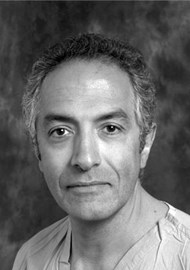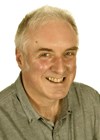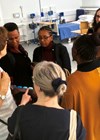Discussing a detour into ophthalmology from zoology in 1988, experiences in Asia, sub-Saharan Africa and Europe and the National Treatment Centre – Highland, Baljean Dhillon interviews his newest guest on the Eye Views podcast, Andy Pyott.
Take us back to the beginning…
1988 was when I started in ophthalmology. I was always very keen to be involved in development and my ideal situation was to be able to work overseas for four or five years and then get my dream job in the Highlands of Scotland. Remarkably, I managed to do that – I’ve had a wonderful career – and as time has gone on, some of what happened has been of benefit to what I’m trying to do now in developing sustainable eye services for the Highlands and for Scotland.
Both my wife and I grew up with experience of families working overseas. I was born in Scotland, but my wife was born in India. She had lived a good part of her life and had her schooling in south India, so she was very keen that we would return somewhere. We always thought that it was going to end up being Africa, which is where the greatest need for ophthalmologists was at that time, and really still is. Back in the 90s, the statistic was about one ophthalmologist per million in sub-Saharan Africa.
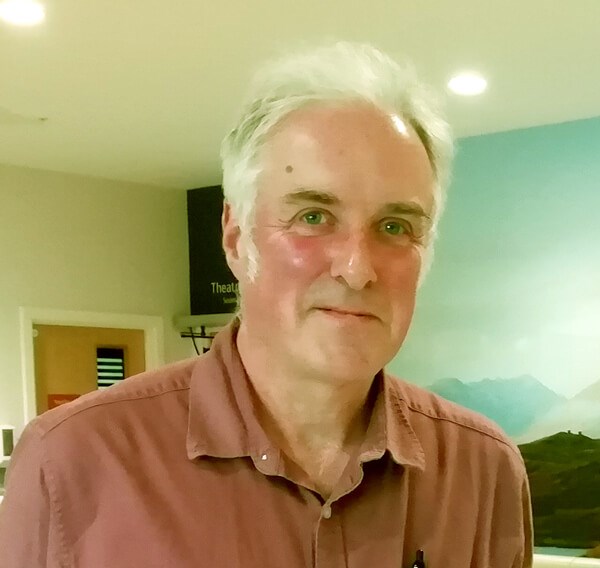
Andy Pyott.
We had applied to work for CBM, an international development agency, otherwise known as Christian Blind Mission, and they suggested certain projects in Kenya and Nigeria, but it was somebody else that suggested that there was a great need in Cambodia. Although we weren’t being given very much detail about it, my wife was saying, “ I think we ought to give this a second look.” And the more we did look into the possibility of Cambodia, the more exciting it turned out to be.
It was a unique experience because we were working in what was a post-conflict situation, so all medical services had been destroyed during the Year Zero policy of Pol Pot and the subsequent wars – the country was pretty well flattened - not infrastructure wise, but in terms of educated people and ability to rebuild the country.
These aren’t easy places to work. There’s personal danger, professional challenges... Did you approach it with some fear and trepidation?
I didn’t know an awful lot about Cambodia. I had seen the film The Killing Fields (1984) and a little bit of reading beforehand, and I still remember the day of flying into Phnom Penh thinking, ‘my goodness me, what on Earth are you thinking taking two young children and a wife into this dangerous country?’ And yet we never really felt in any danger. The first year we would hear gunfire every night, but never did we feel at risk. We were very fortunate that when the coup did happen, we were out of the country, so we missed that particular excitement.
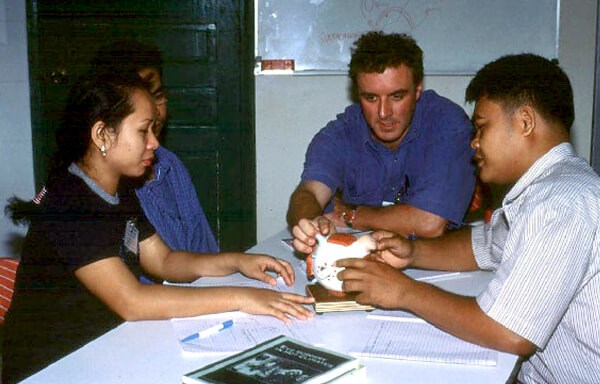
Figure 1: Group teaching of Andy’s third set of three residents, circa 1999, Cambodia.
Looking back, if you were approached by a trainee who wanted to do something similar, would you be slightly hesitant, with what you know now?
No. It was just the most fulfilling experience. I had taken advice beforehand that I really ought to be prepared, firstly to make sure that I had a route back into the UK. It was important that I completed my Certificate of Completion of Training (CCT) before I went and that was very, very sound advice.
The other way in which I was fortunate was that this was a period when there was a transition from ECCE to phaco, and thankfully I had phaco under my belt before I left and was able to pick it up despite the fact that I had been away for five years.
I also put in quite a bit of preparation in terms of going on courses about how you would design an eyecare programme for a country, and to which I am completely indebted to the likes of Alan Foster and Gordon Johnson, who are very firm friends and who I have just the upmost admiration, so they were my mentors.
"I still remember the day of flying into Phnom Penh thinking, my goodness me, what on Earth are you thinking taking two young children and a wife into this dangerous country?"
I managed to get a short scholarship to go and work in Ghana, both in the capital, Accra, and then also at a small hospital in the north. That was a useful experience, just learning how to cope in a very resource-poor environment. That’s where, at that stage, I was going a step back and learn how to do intracapsular cataract extraction (ICCE), which was something I had not been exposed to. It seems incredible now to be talking about it because the world knows that putting in an intraocular lens is essential for rehabilitation of sight. But at that stage, it wasn’t proven that that was a safe thing to do, and so people were still advocating ICCE and then aphakic glasses.
After that, I was very fortunate I think in being probably the last senior registrar to have a post recognised at St. John in Jerusalem, and that was also a transformative experience – not only for the fascination of living and working in that particular part of the world but also the full range of pathology. There’s a huge amount of consanguinity, particularly in the Gazan population, so I saw the most unbelievable things. I used to say that if I didn’t see something fascinating coming through the clinic, it was a bad day, because every day there was something unusual.
The trainee now would not be familiar with the manual technique. Is that going to be a problem? Or do you think phaco is going to supplant small incision cataract surgery (SICS) and other manual cataract surgical techniques?
There’s almost certainly a place for phaco in the majority world, if only as part of a cost-recovery scheme. I think most development agencies would now advocate the training of phaco alongside training in SICS because, for the majority, it’s much better for surgeons to be trained in appropriate techniques. And there’s a huge advantage to SICS, particularly for very dense cataracts where you’re less likely to cause damage to the endothelium. You also have less risk of bad results, because when phaco goes wrong, and you have dropped nuclei and you don’t have the means of retrieval, that can be pretty serious.
I’ve been concerned when I’ve visited some places where I see trainees of that nation – I’m not talking about international visitors – but seeing people being taught phaco in an inappropriate setting, where they are basically being let loose on poor people, which I think morally reprehensible. There’s the same problem there – a trainee coming from this country to practise on poor people elsewhere – I think it’s something you’ve got to be extremely careful about. As long as the same principles of training that we would accept as being normal and essential in this country, as long as that is being applied in an alternative setting, I think that is OK.
Since COVID we’ve been seeing, regrettably, people in this country who are blind due to cataracts. It’s been a huge shock for me to see the full circle. When I started my training, occasionally you would see people who were bilaterally blind with very dense cataracts and I’m seeing it again now. My thinking has completely changed in that I see cataract as not only being a major problem in the majority world but regrettably starting to see it as being a public health issue in this country, too.
Well, it’s come home to roost in that sense... Part of your remit in your overseas trip was not only around service design in cataract surgery but was it also teaching, training and education. Was that a big part of it?
Yeah, absolutely. The other thing that I would say in terms of advice to anybody thinking of working overseas: there is always this slight tension between development and aid. If somebody was to go and take out 50-60 cataracts in a remote part of the world, well that would classify as aid, and in terms of carbon footprint per cataract, far worse than what we actually do in this country.
Unfortunately, a phaco in the UK, in terms of its carbon, does not stack up as well as say a caesarean section or a phaco being conducted in India, because we have so much waste associated with the surgery that we do. But if you’re to multiply that by all the travel involved, you begin to question what is really going on. However, if there is appropriate skill transfer then that is a different story.
When I reflect on my time in Cambodia, in one sense you could say that it, on first viewing, looked like neo-colonialism because there I was as a foreigner, going in to establish something in a country where the local people were not really that involved. It was a slightly unique situation, and I’m glad to say that 25 years on, there are no foreigners now providing a service in that country and it’s completely run by Cambodians.
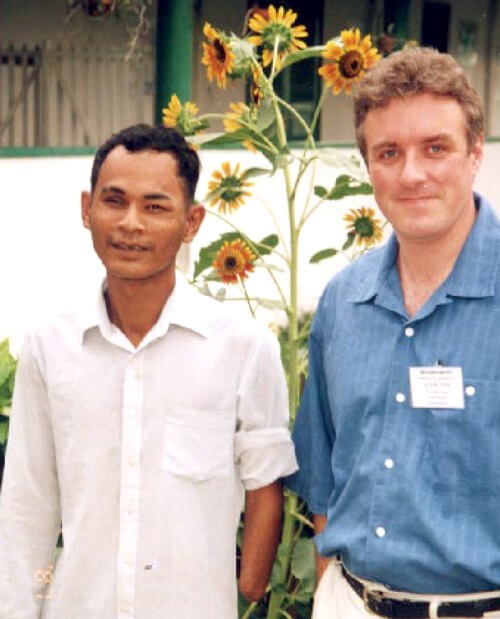
Figure 2: One of the many landmine victims seen daily, circa 1997.
Andy was able to restore vision in his remaining eye by taking out the
cataract which had been caused by the landmine explosion.
I was privileged to be able to go back just before COVID to visit the hospital where I worked, and it was just so remarkable to see the development that had taken place. It was a much more sophisticated hospital, but was there the same degree of subsidy for really poor people? I’m not sure, but that’s because the international tap had been turned off because development agencies want to move away from aid, and they will only give money to support development and education. I think that’s right; each country has got to work out how it’s going to fund the services that the people need appropriately.
You touched on carbon footprint and that’s something I know you’re very passionate about. When did you start thinking about that? When you were in Cambodia, was that something that came up on your radar?
Well, no. I think times have changed. I look back in horror at some of the occasions when I made huge journeys across the world. There was one summer when I criss-crossed between Europe and Cambodia three times within the space of about six weeks and I just accepted, at that time, that’s what you’ve got to do. Whereas now if I’m planning any trip, I’m seriously thinking, can the planet justify what I’m about to do?
And what’s the answer?
I’m certainly trying to restrict the amount of travel. During COVID, I was unable to go and visit friends and projects I was involved with in Indonesia. I take my hat off to the Indonesians – they’re often far ahead of us in being able to work with technology and they had me contributing to conferences over the internet. They even had me as an external examiner for their graduating exams. That was a huge privilege.
And if you were to speak to your younger self, knowing what you know now, would you have done anything differently?
I don’t think I’ve got any huge regrets. I mean, I made mistakes, and I think that there’s always a danger of seeing things from your own prejudice. I’m sure that my younger self was probably a little more bombastic and perhaps even arrogant in thinking that I knew the answers to problems, whereas being aware of local culture is so important.
I do recall one meeting I had when the son of one of the local health officials was sort of foisted on me as a trainee. I was getting extremely upset, and I was at the point of becoming very angry, which is not something you should do in Cambodian culture. Thankfully, a Cambodian doctor, who I respected greatly and who was senior to me, kicked me under the table and told me to be quiet. Afterwards, she said, “Don’t worry. Everything will be OK. We will sort things out in a different way. It’s really important [that] you mustn’t get angry.” That was an important lesson, but you know, I’m sure with youthful enthusiasm you can get carried away. I hope that as I’ve got older, I’ve realised the importance of listening to others and being aware that there are other ways of seeing round a problem, and accepting local advice is always important.
You got kicked under a table, but I think you’ve still got that youthful enthusiasm, Andy, because not content with making a massive contribution in terms of global ophthalmology and your overseas commitments, you then brought it here, because you took on lead roles in Inverness – you continued being as energetic and enthusiastic across a whole number of domains, not least Wales. So, from Indonesia to Wales... how did that come about? What’s the story there?
The reason that I had a skill that I hope was useful to ophthalmology in Wales is that when I returned to Scotland in 2000, I did feel the loss of not being involved in eyecare development. So, I suggested to CBM that I would be happy to carry on part-time work as a medical advisor to their projects in Asia, and each year I was returning and looking at projects in quite a variety of different countries. I developed this skill of being able to go in and make a very rapid assessment of what was going on in a particular hospital, being able to pick up when things didn’t seem quite right and ask the right questions of different levels of staff.
That was transferrable to hospitals in the UK as well, and I think people aware of what I had done in Asia asked whether I would be prepared to do that for Wales. It was a country I didn’t know at all – I had one or two friends who worked there but no real knowledge and it was nice to be able to make friendships with colleagues there. I hope something of what I said in the report will be of benefit to the medical establishment and to the patients in Wales.
And do you anticipate the change will come on the back of the report?
I hope so, but the deal was that it was a short-term involvement and that I was not to expect or be asked to give any further opinion – it was very much a snapshot of the situation in Wales and what would be [my] advice for the future, and so that’s what I did. When I left Cambodia, although that was a project very dear to my heart, I made a firm decision that I was not to interfere with how the project developed and so I did not give advice from afar and just let my successor take the credit. I think it’s important to do that because sometimes people can hang around too long and start to become resented rather than remembered fondly.
Well, you’re certainly remembered fondly from everyone I speak to. And then, of course, coming home to roost in Inverness, you have a brand-spanking new facility…
Well, it’s something I’ve been striving to obtain for over 20 years. We were in an incredibly tiny department and the great day came when we were given new facilities. Alas, I can still remember looking around and, having had experience elsewhere, I’m afraid I shook my head and said, “Well, this is all very nice, but I predict within two or three years this is going to be too small.” Regrettably, that did happen, and the last few years have been extremely difficult as we just couldn’t get all the work done in the space we had.
"I hope that as I’ve got older, I’ve realised the importance of listening to others and being aware that there are other ways of seeing round a problem, and accepting local advice is always important"
Over the years there were various projects devised to try and solve our problem and at times, funding was given, but then it never seemed to come to fruition. We were very fortunate recipients of a visit from Carrie MacEwen who was doing a series of peer-review visits, and her conclusion was that the facilities we had were impossible for us to provide safe and appropriate care for our patients. That was what finally released the blockage to get something moving.
What was suggested at the time was that we would have just a cataract factory built on the other side of the A9 on the university campus, and we universally resisted that and said, “This is not going to benefit us. We’re going to have all the problems of split-site working and none of the benefits because it’s not going to solve our ultimate problem, which is a very inappropriate space that’s not designed to manage patients for modern services.” So, we were able to persuade them that yes, we needed a completely new build which would incorporate a treatment centre performing high-volume cataract surgery, but it would be comprehensive. And so that’s what we’ve got and it’s very exciting.
At the opening, which was not that many months ago, I was able to see the architect again. He had been involved with us in the planning and he said that he always says to people asking him about this project that he curated, he did not design our hospital. We spent two weeks with all the stakeholders going through a very lengthy process of thinking about the patient journey, for every single way in which they come to have our services, whether it’s macular or cataract, glaucoma, cornea. We plotted through absolutely every step that every patient would make and then made sure that the whole process, the whole flow through the building, was going to be efficient.
I met a patient socially just a couple of days ago and they were remarking what a lovely experience it is to come to this lovely building and how it doesn’t feel like a hospital. The important thing for them was they said that what used to be a two-hour wait of everybody sitting, looking rather glumly at each other, was now being sped up, that the journey time has been halved, and it’s a pleasant experience and the staff seem to be happy. It’s a good place for us to work. I thought that was really the nicest comment to hear from a patient.
That’s the cherry on the cake right there. So that flow through from looking at patterns of working, patient throughput and surgical efficiency, it seems to have stemmed from both your overseas observations and desire to improve services at home. The new facility that you have is a big box that’s ticked, and I know that you’re thinking about the next phase of where you’re going with your professional and personal work, so it would be remiss of me in the final moments of this interview not to mention apiaries and all things bee related. When you started, or even pre-ophthalmology, you were a student at St. Andrews…
I was never going to be a doctor. I was very dismissive of my colleagues at school who were going off to study medicine. I was very denigrating of them, saying they were not true scientists, and that’s what I wanted to be. So, I went off to study zoology and in my final honours project, I did dissections of fruit fly larvae. Interestingly, it was the eye-antennal discs that I was working with in vitro and you know, when I compare what I was doing then to the microsurgery that I’m doing now, it’s almost like carpentry, because that was really, really fine stuff. So, about a dozen years ago I took up beekeeping because I was concerned about the plight of pollinators and that has been a very enjoyable hobby, although I find I don’t spend enough time doing it.
Where things have come full circle just a few weeks ago, I went on a course to learn how to select for queen rearing. Somebody was telling me their concern about trying to re-establish the genetics of the native Scottish bee and that that was going to involve artificial insemination. I thought, ‘well, just the perfect thing for a microsurgeon to do,’ so that is in my plan for next year, to learn how to artificially inseminate bees.
Well, you heard it here first... actually, talking about genetics, you and your brother are heavily invested in all things ophthalmology and David and Molly [Pyott] have worked very closely with us here at the University of Edinburgh in supporting scholarships. Is there a dominant gene at play between the two brothers?
Ah well, I think it’s almost serendipitous. I clearly remember when my brother sent me an email when I was working in Cambodia to inform me that he was going to be working for a company called Allergan. He asked, “could you fill me in a little bit about what ophthalmology is about?” So, I wrote a very tongue-in-cheek, little pamphlet for him called Ophthalmology for Dummies. Not to suggest that he’s a dummy in any way! Of course not. That would be completely inappropriate because he of course has been extremely successful in his career.
Oh, fantastically so.
He’s been supportive, at short notice, when I’ve needed to find travelling scholarships for people to get training. Unfortunately, in the developed world when you realise a need, you’re usually told it’s going to take 12-18 months to get that funding approved. Of course, that’s not the way things work and there have been occasions where I’ve seen individuals who urgently needed a visit to Europe from Indonesia to have training and David and Molly very generously supported that. Even more recently, when a colleague alerted me of somebody who needed support for a training that they wanted to do in Uganda – a Tanzanian doctor – again, they were very generous in supporting that.
Absolutely. In terms of continuing the educational theme, the scholarships that I did through the Pyott Foundation have been invaluable for a growing cohort of global ophthalmologists – it’s truly invaluable. Andy, drawing this conversation to a close, it’s been an absolute delight and a pleasure just listening to some of the anecdotes and the enormous list of boxes that you’ve ticked, but you’ve got many, many more years to contribute to ophthalmology.
COMMENTS ARE WELCOME



